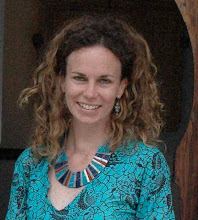-all photos in the article are by Lucas Cuervo
Maciene is not your typical handicraft-producing community development project. At its core, the essential principles of sustainability, environmental awareness, and community empowerment are solidly in place. But its Maciene’s “luxury end product” that sets it apart: handmade artisan g
 oods of the highest quality ready for consumption by the world market.Maciene is the brainchild of Eduarda Cipriano, HIV/AIDS Coordinator at Foundation for Community Development (FDC), a Maputo-based non-governmental organization headed by Nelson Mandela’s wife, Graca Machel. Maciene aims to appeal to a clientele that buys its products because of their high quality, functionality and beauty, and not as a gesture of charity towards those who produced them. It just happens to be an extra bonus that Maciene’s customers receive the added gratification that they are helping to support the local community through their purchase.
oods of the highest quality ready for consumption by the world market.Maciene is the brainchild of Eduarda Cipriano, HIV/AIDS Coordinator at Foundation for Community Development (FDC), a Maputo-based non-governmental organization headed by Nelson Mandela’s wife, Graca Machel. Maciene aims to appeal to a clientele that buys its products because of their high quality, functionality and beauty, and not as a gesture of charity towards those who produced them. It just happens to be an extra bonus that Maciene’s customers receive the added gratification that they are helping to support the local community through their purchase.
Maciene is not only a brand name, but also a village located about 20 kms from Xai Xai, directly off the EN1 highway that runs North-South through Mozambique. The Maciene community has been irrevocably altered for the better in very real terms through the impact made by this grassroots project. In contrast to the more typical “handout” approach of development ventures, Maciene’s mission is to provide opportunities for income generation, which motivates and empowers community members who can better provide for themselves and their families. Profits return to the community, 20% of which are directed towards a community trust fund that supports Maciene’s AIDS orphans.
While in the process of becoming an artisan cooperative, Maciene’s Paulo Mabumo Arts Centre has already trained over 60 elderly women in embroidery and as many as 100 artisans in techniques such as weaving, dying and making recycled paper. More than 300 families from the community supply the Centre with raw materials including a host of different leaves, bark, roots, petals, and recyclables which are found in the immediate environment and used to make Maciene’s more than 500 different products.
 Maciene’s product line includes four basic categories. Paper made from banana fiber is used in the assembly of artisan stationery, scrapbooks, photo frames, boxes, notebooks and lamps. Cloth is hand-dyed using inks extracted from the roots and bark of cashew and mafureira trees, and then turned into exquisite shawls, scarves, bedspreads, pillows, curtains and bags, all with batik and needlework detailing. An array of different materials including recycled tire, plastic bags, and colorful “capulana” fabric, are used in the weaving of rugs, place mats, runners, and bags. Finally, some products are given the added touch of embroidery based on drawings done by village children. A personal favorite is the embroidered commentary on the diversity of African women’s hairstyles found on select bags and shawls.
Maciene’s product line includes four basic categories. Paper made from banana fiber is used in the assembly of artisan stationery, scrapbooks, photo frames, boxes, notebooks and lamps. Cloth is hand-dyed using inks extracted from the roots and bark of cashew and mafureira trees, and then turned into exquisite shawls, scarves, bedspreads, pillows, curtains and bags, all with batik and needlework detailing. An array of different materials including recycled tire, plastic bags, and colorful “capulana” fabric, are used in the weaving of rugs, place mats, runners, and bags. Finally, some products are given the added touch of embroidery based on drawings done by village children. A personal favorite is the embroidered commentary on the diversity of African women’s hairstyles found on select bags and shawls.At first blush, you wouldn’t expect that Maciene wares are produced in a rural village. They look like high-end, well-designed and expertly crafted merchandise that one might find in an eco-artsy boutique in the middle of Cape Town, Rome or New York. But when you learn of the concept behind the products and how they are made, it makes Maciene that much more appealing.
Luckily, Maciene welcomes visitors, and the beauty of community members perfecting organic goods drenched in natural colors is a site to behold. Simply call Ruy Santos from FDC to make arrangements. Basic lodging is available, and you are welcome to observe, photograph, and learn alongside Maciene’s skilled artisans. The village is also in walking distance to the beach, and there is an on-site gallery store where goods are available for purchase.

But perhaps it’s more likely that Maciene will make its way to you first. Maciene is already a well-recognized brand within Maputo, and before we know it, Maciene will appear in South Africa’s specialty boutiques and beyond. Although the Maciene team is actively looking for more retail outlets, products are currently available in Maputo at the boutique at Holiday Inn and at the Airport Gift Shop inside the departure lounge. Maciene also has a showroom at FDC’s offices located in the JAT building on Avenida 25 de Setembro where you can browse and purchase the full line of goods. The showroom is open Monday – Friday, 8:00 – 4:30 PM, but it is best to contact Ruy in advance if you plan to give back to the people of Maciene by indulging in some retail therapy.
Ruy Santos: +258 82 387 2499 or rsantos@fdc.org.mz

No comments:
Post a Comment